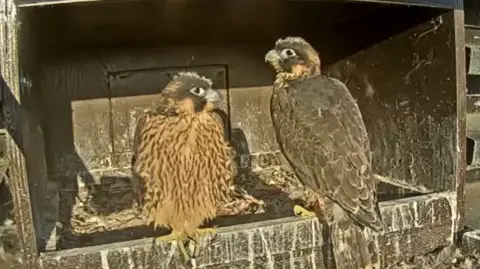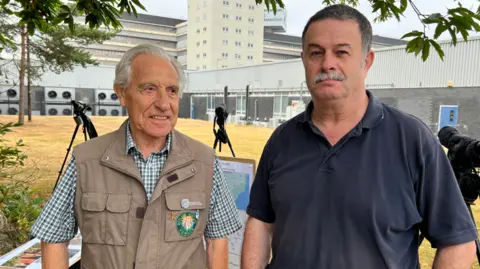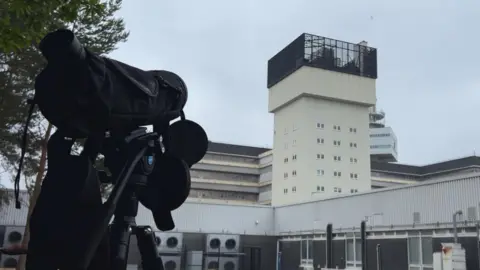BT water tower peregrines prepare to leave home
 Adastral Park PerryCam/BT
Adastral Park PerryCam/BTA pair of peregrine falcon chicks were expected to fledge their lofty perch in the next few weeks.
The juveniles were offspring of the first breeding pair to nest at a newly-constructed box on the water tower at BT's Adastral Park in Martlesham, near Ipswich.
Members of staff have kept track of the birds' progress, having already seen many of their fledglings take flight there since 2019.
"It's been a complete saga here - once these two youngsters fledge, it will be 23 birds that have come from this nest site," said raptor expert Peter Merchant.
"About 3,000 staff work here, and I often have 30 to 60 people gathered around me to hear more about the birds - the enthusiasm is great."
 Stuart Howells/BBC
Stuart Howells/BBCHe said the chicks had survived "against the odds" and were the offspring of birds who had been regularly seen fighting. Their eggs also took 44 days to hatch, far longer than the expected 33 days.
The young birds will be registered, ringed and have DNA swabs taken to allow the British Trust for Ornithology to keep track of their progress after they leave Martlesham in about five weeks.
"Once they nest we can stand a chance of locating them," added Mr Merchant.
"We have got birds from East Anglia in Scotland and some in Amsterdam, so they do travel quite large distances."
Engineer Robert James helped install this year's replacement box some 45m (147ft) from the ground.
He said the birds had done the maintenance crew a "big favour" by keeping the pigeon population down.
"A lot of staff are interested; there is a live feed on YouTube and people, when they have time in the offices, can sit there and watch them," he added.
"It's great to see that conservational part of the site."
 Stuart Howells/BBC
Stuart Howells/BBCFollow Suffolk news on BBC Sounds, Facebook, Instagram and X.
